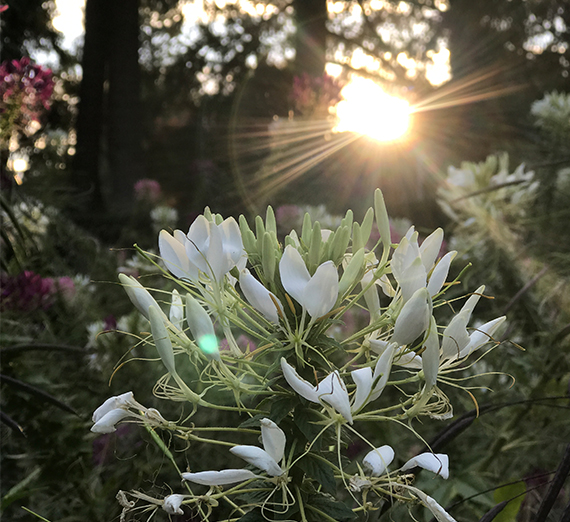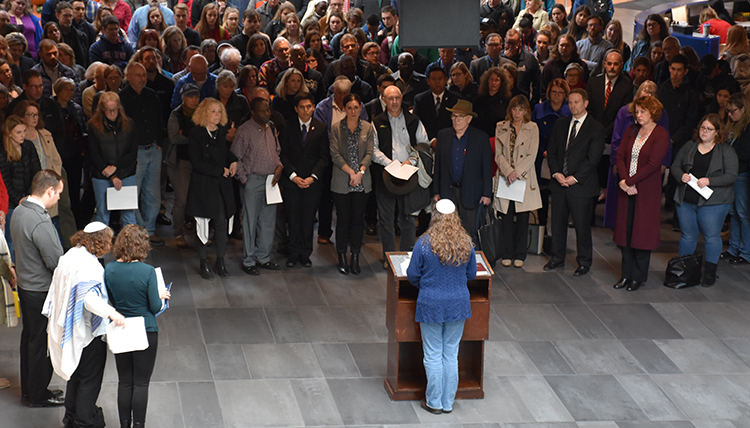Standing in Solidarity: A Response to the Pittsburgh Massacre

In the days following the horrific violence against members of the Jewish community in Pittsburgh, Gonzaga faculty, staff and students gathered to pray for peace and healing. Several Jewish members of the faculty shared from their faith tradition; following is the message from Rebecca Marquis, associate professor of modern languages.
What do you do in the wake of a horrible tragedy? Especially when there seems to be so many lately. I asked myself that this weekend, as I have so many times.
As I heard the news that the shooter said, “Kill all the Jews!” I thought: This is me. This is my children. This is my community. And this is what I turned to: The deeply rooted parts of our tradition that teach us that we are an essential piece of social justice, of healing our world. Replace fear with love – remember that this is the heart of what it means to be Jewish.
As I read about the ill-conceived reason for the shooting, I reflected upon the last two weekends and the sharp contrast they presented me. On October 19, I, along with many other Jews, attended the National Refugee Shabbat. Our services paid special attention to how Jewish tradition teaches us to welcome the stranger because we have often been strangers. Representatives from local refugee aid and resettlement organizations spoke about their work in the Spokane community. They prayed with us and we made connections – some that I will even be able to bring into my classes at Gonzaga. The evening was so nourishing to the soul. I was so proud to be a part of this sacred commitment to helping others, proud that my Jewish community values those who are most vulnerable so much.
And one weekend later: I missed Shabbat to be at a conference and found out later on Saturday about the shooting. A shooting that took place in a sacred space at a sacred time. Violence in the very place that had also celebrated Judaism’s commitment to helping refugees the previous week. I learned that the shooter targeted HIAS (Hebrew Immigrant Aid Society), a Jewish-run organization that helps to resettle refugees, mostly if not all non-Jewish. When asked why HIAS helps non-Jews, its president and CEO, Mark Hetfield often responds, “We used to help refugees because they were Jewish. Today we help refugees because we are Jewish.” This is the spirit of Judaism. This is why I am so connected to my community.
The call to social justice is why this tragedy reminds us that it is not just a fight against anti-Semitism, but part of a larger fight against hate and discrimination. It reminds us to carry in our hearts today the two African-Americans shot at a local grocery store recently. It is a call to fight against the systematic discrimination and violence directed as so many communities that share our nation as their home. And so as we grieve, we remember that call to do good, to carry the work of helping others constantly in our minds and actions. In the face of hatred that seeks for us to be silenced, we respond with our actions.
I return to the night of October 19 with more resolve than ever. As Jews, we stand with the most vulnerable, and we are grateful for our allies who stand in solidarity with us today. At Gonzaga, we all strive to live our mission of social justice, and it is moments like this where it is so clear that my varying communities can come together, in grief, and peace, and love, and fellowship, yet always remembering that there is so much work to be done.
I would like to end with an interpretive prayer from Friday night Shabbat services – a prayer that urges us never to become complacent, to remember that on even our most sacred days and spaces, we are called to action.
Disturb us, Adonai, ruffle us from our complacency;
Make us dissatisfied. Dissatisfied with the peace of ignorance,
the quietude which arises from a shunning of the horror, the defeat,
the bitterness and the poverty, physical and spiritual, of humans.
Shock us, Adonai, deny to us the false Shabbat which gives us
the delusions of satisfaction amid a world of war and hatred;
Wake us, O God, and shake us
from the sweet and sad poignancies rendered by
half forgotten melodies and rubric prayers of yesteryears;
Make us know that the border of the sanctuary
is not the border of living
and the walls of Your temples are not shelters
from the winds of truth, justice and reality.
Disturb us, O God, and vex us;
let not Your Shabbat be a day of torpor and slumber;
let it be a time to be stirred and spurred to action.
Excerpt from Mishkan T’filah: A Reform Siddur, copyright © 2007 by Central Conference of American Rabbis. Used by permission of Central Conference of American Rabbis. All rights reserved. Not to be distributed, sold or copied without express written permission.

